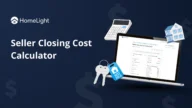Selling FSBO? Tally Your Closing Costs Without a Realtor
- Published on
- 10 min read
-
Lori Lovely, Contributing AuthorCloseLori Lovely Contributing Author
Lori Lovely edited the Real Estate Home section for the Indianapolis Star and covered the annual Dream Home construction and decor for Indianapolis Monthly magazine. She has written guides for selling houses and more.
-
Sam Dadofalza, Associate EditorCloseSam Dadofalza Associate Editor
Sam Dadofalza is an associate editor at HomeLight, where she crafts insightful stories to guide homebuyers and sellers through the intricacies of real estate transactions. She has previously contributed to digital marketing firms and online business publications, honing her skills in creating engaging and informative content.
If you choose the For Sale By Owner route as you sell your home, you’ll save on the listing agent’s commission. Other than that, you’re on the hook for the same closing costs as any other seller. Closing costs without a realtor can catch many sellers off guard, so it’s essential to know what to expect at the closing table.
Mandatory costs include a long list of fees and taxes from involved parties, such as the local and state governments and mortgage lenders. Additional closing costs may include any seller concessions, attorney fees, and the buyer’s agent’s commission.
Beyond these closing costs, FSBO sellers cover expenses normally included in a listing agent’s commission, such as marketing costs. All in all, FSBO sellers don’t save as much money on their home sale as you might expect — just one reason why only 6% of sellers chose to sell their home without a real estate agent.
We’ll break down FSBO closing costs line by line so you know exactly what to expect and avoid any sticker shock. Our analysis includes data from nationwide studies and surveys, government revenue websites, and on-the-ground insight from top Louisville, KY, agent, Jay Pitts, who has more than a decade of real estate experience.
The truth about agent fees in FSBO sales
When you’re selling without a Realtor, it might seem like agent commissions are off the table, but that’s not entirely the case. While you can avoid paying a listing agent’s fee (typically around 3% of the sale price), you may still be responsible for the buyer’s agent commission, which is also about 3%.
Technically, commissions aren’t considered part of closing costs, but since they’re paid at closing and deducted from your proceeds, it’s relevant to include them in this discussion.
Following the National Association of Realtors’ (NAR) landmark settlement, listing and buyer agent fees have been decoupled, and buyers are now encouraged to negotiate compensation directly with their agents. However, many sellers still opt to cover the buyer’s agent commission to make their property more attractive and facilitate a quicker sale.
HomeLight’s 2025 Top Agent Insights: AI Edition survey found that covering the buyer’s agent commission is the top seller incentive, with 73% of agents saying it helps sell a home.
“A great percentage of buyers are represented by agents. Some sellers attempt to waive the fee and sell directly, but it doesn’t go well. First-time and infrequent buyers are not comfortable with the process without a broker,” Pitts observes.
Closing costs without a Realtor
Beyond the agent fees, there’s a laundry list of closing costs a seller is saddled with, regardless of whether they sell their home with or without a real estate agent. While closing costs for sellers vary from state to state, they typically average 1% to 3% of the final sale price — that’s excluding any agent commission.
Here’s an overview of the most common closing costs for sellers without a Realtor:
Escrow fees: Typically split between buyer and seller, escrow fees cover property tax payments paid in advance to the lender to hold in escrow. Escrow generally costs 1% to 2% of the final price, so sellers can expect to pay 0.5% to 1% of the sale price in escrow fees.
Title fees: These fees include a title search to verify that the seller owns the property, and without any conflicting liens. Depending on the sale price and the location, title fees can range from $300 to $1,500.
Reconveyance fees: Once your mortgage is paid off, you’ll have to obtain a reconveyance deed to prove it. The typical fees range from $50 to $65.
Recording fees: After obtaining a reconveyance deed, the seller must have it recorded, usually at the county recorder’s office. Some municipalities include recording fees in the transfer taxes, while others charge them separately. The cost differs from county to county. It could be as low as $15, or it could start at $75 for the first page, with an additional dollar or two for every page after that.
Transfer taxes: These taxes are imposed by the city, county, or state to transfer title and register a change in ownership of the property. They are either calculated as a percentage of the sales price or as a flat fee. See our state-by-state guide to transfer taxes for a local estimate.
Hold on: Some sellers pay these closing costs, too
Depending on your home sale, you may owe additional closing costs, such as the following:
Attorney fees: If you have a real estate lawyer representing you at closing, you’ll pay for the attorney fees. An attorney may charge by the hour — $150 to $400, or they may charge a flat fee for outlined services such as preparing closing documents.
“Sometimes closing attorney’s fees are split. But a FSBO seller must pay wire fees,” Pitts says. Sellers are usually responsible for the cost of closing document preparation, as well.
Note that some states require a real estate attorney to be present at closing, whether you have an agent or not.
Seller concessions: Buyers may negotiate a financing concession, in which the seller pays part or all of the buyer’s closing costs. Often, a buyer negotiates for concessions, so they owe less in cash at the time of closing.
“At 3% of the sales price, that’s a substantial amount,” Pitt notes.
Lenders set limits on seller concessions depending on the loan type, whether the home is a primary or secondary residence, and the size of the down payment. For example, the Department of Housing and Urban Development (HUD) caps seller concessions for FHA loans at 6% of the sale price.
Mortgage payoff: You’ll have to pay off the remainder of the loan on your home. To find out how much you owe, contact your lender or servicer and request your payoff amount. The payoff amount is the total you’ll have to pay to satisfy the terms of your mortgage, including any interest you owe until the day you plan to pay your loan in full.
Holding costs: Expect to cover holding costs or carrying costs between the time you accept an offer and the sale closes (typically 30 to 45 days). During that time, the seller continues to pay the monthly mortgage payment, taxes, insurance, homeowners association (HOA) dues, and utility bills.
FSBO fees: You’ll spend some of your 3% commission savings
Sure, as a FSBO seller, you save on the listing agent commission, but there are hidden fees in doing it yourself. Discounting the value of your time, expect to shell out for the following costs that are normally included in an agent’s commission:
Home appraisal: To set a listing price, FSBO sellers often hire an appraiser to determine the home’s fair market value, based on comparative properties, or “comps.” Expect to pay between $350 and $550 for an appraisal. The national average is around $358, but the actual cost will depend on your home’s size, property type, and location.
MLS listing: If you want to get your listing in front of buyers, you need to get it on the multiple listing service (MLS). 88% of sellers in 2024 listed their homes on the MLS. This platform is the number one listing source and auto-syndicates your property details to the major online listing sites. You can pay a limited-service real estate agent to put the listing up for you or go through a flat-fee MLS listing service.
Professional listing photos: Don’t expect buyers to take your listing seriously if all of the photos were shot on your smartphone. Pay for a professional real estate photographer to take photos and videos. The cost is around $110 to $300 per project.
Digital and physical advertising: You can stick a sign in your yard and place a free ad on Craigslist, but to reach a broader audience of buyers, you’ll need to spend some money. At the very least, you’ll need signs, brochures, some classified ads, and perhaps some paid ads on social media. The low end for marketing runs from $50 to $200. There is no top end, as the sky’s the limit.
Pre-listing home inspection: By presenting the buyer with a completed pre-listing inspection report form, you can allay some concerns and save time on the sale process. For an average cost of just over $343, you can have your home inspected.
Property survey: For the same reasons mentioned above, a property survey can grease the wheels of a sale. The cost of a survey depends on the size of your property and its location, but Angi puts it at $475 to as high as $25,000
Open house: The price of an open house varies widely, depending on where you live and how elaborate you want to go. Will you offer food and drinks? Will there be staging, decorations, or other attractions? While only 3% of buyers visit open houses, it’s worth the effort to help promote your home.
Staging: Whether you hire a professional stager or add select pieces, staging can enhance the appeal of your home. Professional stagers are pricey, charging $1,500 to $4,000 for just a few rooms. You may have to commit to multiple months of furniture rental if your home doesn’t sell quickly.
Learn by example: The sum of closing costs without a Realtor
To give you a better picture of FSBO closing costs, here’s an example, based on a house that sold for $400,000 (close to the median national price):
- Sale price: $400,000
- Buyer’s agent commission at 3%: $12,000
- Escrow (1%): $4,000
- Title search: $300-$600
- Title insurance: $1,000
- Home inspection: $300-$500
- Appraisal: $300-$400
- Property survey: $800-$1,000
- Transfer taxes: $75
- Recording fees: $50
That’s $18,825 to $19,625 for just the necessary paperwork. Add in repairs, seller concessions, attorney fees, and FSBO expenses normally covered in a listing agent’s commission, and the total closing costs reach well above $20,000.
Using HomeLight’s Net Proceeds Calculator and keying in a particular location, say, Santa Monica Boulevard, Beverly Hills, California, the closing cost amounts to $32,00 for a home sold for $400,000, factoring in a 3% agent commission.
FSBO: Fizzle or sizzle?
For first-time and busy sellers, the time and responsibilities FSBO demands are usually not worth pocketing some of the 3% commission saved without a listing agent.
If your reason for considering a FSBO sale is monetary, consider the fact that FSBO homes sold for a median price of $380,000, notably lower than the $435,000 median price of agent-assisted sales. Properties sold through agents generally command superior prices.
HomeLight’s analysis of transaction data supports this, revealing that the top 5% of real estate agents help sellers sell their homes for 10% more than the average.
Ultimately, the decision to FSBO or sell with a real estate agent is up to you. Perhaps you’re a diehard DIYer or a budding agent yourself. Just know what costs you’re on the hook for as a FSBO seller before you commit. In case you change your mind and want expert guidance and the best chance at a successful, profitable sale, use HomeLight’s Agent Match to instantly get connected with a skilled real estate agent who can make all the difference.
Header Image Source: (spacezerocom / Shutterstock)









